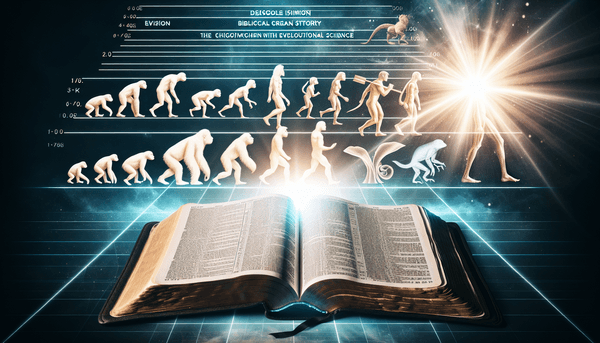The Seven Days of Creation and Their Significance
The seven days of Creation, as recounted in Genesis, are rich with theological meaning, revealing the methodical artistry of God's work. These days, often interpreted as symbolic epochs, display a deliberate and progressive unfolding of the cosmos—from the calling forth of light to the formation of humankind in God's own image (Genesis 1:3-27). Throughout this narrative, we find a Creator who is not only powerful but purposeful, bringing order and life where there was none, as the Lord 'founded the earth by wisdom' (Proverbs 3:19). The culmination of this creative endeavor is marked by God resting on the seventh day, a divine act that sanctifies the Sabbath and establishes it as a day of rest for humanity (Genesis 2:2-3). This scriptural account invites us to marvel at the sovereignty and completeness of God's work, a testament to His glory and a foundational reason for our worship.
The Theological Significance of God's Rest on the Seventh Day
The act of God resting on the seventh day carries with it profound theological significance. It symbolizes the completion and perfection of Creation, as 'on the seventh day God had finished the work he had been doing' (Genesis 2:2). This rest is not due to weariness but is an expression of satisfaction and fulfillment in the work completed, a model for human beings to emulate (Exodus 31:17). Observing the Sabbath is thus an acknowledgment of God's sovereignty and the completeness of His creative acts. In the New Testament, Jesus affirms His lordship over the Sabbath, inviting us to find not only physical rest but also spiritual liberation in Him (Matthew 12:8, Matthew 11:28-29). The Sabbath rest points to a future hope, an eternal rest that awaits the faithful in God's kingdom (Revelation 14:13). For those seeking to deepen their trust in God's plan and to find strength against temptation, further insights can be found in this spiritual guide.
The Role of the Sabbath in Biblical Times
The Sabbath has been an integral part of the Judeo-Christian tradition since ancient times. The commandment to 'remember the Sabbath day by keeping it holy' is deeply rooted in the covenant between God and His people (Exodus 20:8). It serves as a weekly reminder of God's deliverance and provision, a day set apart for rest, worship, and reflection on the Almighty's grace and steadfast love (Deuteronomy 5:15). In biblical times, the Sabbath was observed by refraining from work, allowing the land and all who dwell on it to rest (Leviticus 23:3). This practice provided an opportunity for the community to gather, reflect on God's word, and collectively renew their spirit, a rhythm that offered balance and perspective in the midst of life's demands.
FAQ
Q: What do the seven days of Creation represent?
A: The seven days of Creation represent God's methodical and purposeful actions in bringing the universe and all living things into existence. They are often interpreted as symbolic epochs rather than literal 24-hour periods, highlighting the theological significance of God's creative power and design.
Q: What are the specific acts of God's work on each day of Creation?
A: On the first day, God created light and separated it from darkness. The second day brought forth the sky and the division of waters. On the third day, dry ground appeared, and vegetation was created. The fourth day saw the creation of the sun, moon, and stars. Sea creatures and birds were created on the fifth day, and land animals and humanity on the sixth day. The seventh day was God's rest, sanctifying it as a day of rest.
Q: What is the significance of God resting on the seventh day?
A: God resting on the seventh day symbolizes the completion and perfection of Creation. It establishes a pattern for humanity to follow, setting aside the Sabbath as a holy day of rest. It is also a sign of divine satisfaction and serves as a model for human behavior.
Q: How does the Sabbath foster a sense of dependence on God's provision?
A: By refraining from work on the Sabbath, believers acknowledge that their sustenance and well-being come from God, not solely from their own efforts. It serves as a reminder of God's faithfulness and provision, encouraging trust in His care for His creation.





